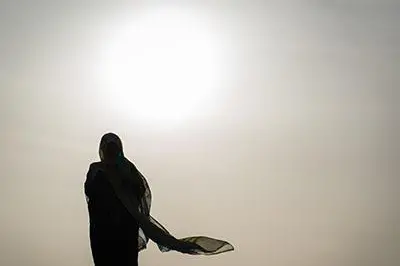PHOTO
Thousands of women around the world, of all religions and backgrounds, marked the 10th annual World Hijab Day on Tuesday by posting selfies on social media with the hashtag #DressedNotOppressed.
“Unfortunately, there are some countries that want to ban our religious garments across their entire countries, (and this event) allows us to find more of the voices who are against this oppression (in the form) of denying our right to wear our religious garments,” a spokesperson for the World Hijab Day Organization told Arab News.
This year, organizers of the event are calling on teachers around the world to stand in unity and solidarity with Fatemeh Anvari, a Canadian Muslim teacher who in December was removed from her classroom in a school in Quebec because she wears a hijab. Under a law passed in 2019, civil servants in “positions of authority” in the province are barred from wearing visible religious symbols at work.
“Canada appears to only be doing (this) in Quebec, where they have close ties with France, (but) some countries are more aggressive as a whole and it can make it more difficult for us to help our fellow Muslims to be able to live as they wish,” the spokesperson added.
WHD said support for the event and the “Teachers For Fatemeh” campaign from non-Muslims has grown this year.
“When people see the possibilities of what their Muslim friends go through, they jump into action,” they said. “Muslims must also be willing to properly educate their non-Muslim friends and family.”
As part of the events marking the day, a global virtual conference was held at which speakers and other participants discussed issues surrounding “hijabophobia,” and offered perspectives on the issue related to youth, the workplace and everyday life.
For the first time, WHD this year collaborated with a number international organizations and businesses — including American Airlines and Meta, the parent company of Facebook — in an effort to step up the campaign, raise awareness and extend its reach.
World Hijab Day, celebrated each year on Feb. 1, and the non-profit organization behind it were founded in 2013 by Bangladeshi American Nazma Khan with the aim of educating people and raising awareness of why many Muslim women choose to wear the hijab, and to encourage women to wear and experience it for a day. The annual event, which originated in New York and was initially organized on Facebook, has grown into a global phenomenon.
WHD said that women who wear hijabs, who are known as hijabi, have to contend with a number of stereotypes surrounding them, including the idea that Islam is a violent religion, that the hijab is associated with terrorism, and that Muslim women are oppressed and forced to wear it.
“Speaking against these things because they are not true comes with criticism and backlash,” WHD said. “All we want is our freedom to wear what we want and be safe doing so.”
The degrees to which hijabi women have integrated into society differ around the world and each country or city presents its own particular challenges.
“If we can set examples and have hijab-wearing women in one place, this can lead to more acceptance in other places,” WHD said. “Television and journalism are great fields for Muslim representation because we are often misrepresented by the media.”
Ridwana Wallace-Laher, a British Indian hijabi from Bradford in England, is breaking down barriers in the Islamic charity sector in the UK, which has traditionally been male-dominated. Recently promoted to senior director of growth at international humanitarian charity Penny Appeal, she manages several of the organization’s key departments, including marketing, communication, fundraising and donor care.
“I am in a privileged position,” she said. “I can sort of establish myself as a role model. We’ve got a lot of young females who volunteer with us, who come and work for us, so I think it’s a very positive thing for them to see that with the right attitude and the right passion, you can just be as good as male counterparts.”
From the charity’s perspective, Wallace-Laher said it is a positive sign for Penny Appeal to show women that it offers equality when females are so heavily outnumbered in the sector. She added that she is encouraged by the fact that society is evolving and people are becoming more aware and more accommodating of others.
The mother-of-two said it is important that Muslim women do not allow themselves to be affected by the stereotypes and stigmas attached to wearing the hijab. When dealing with challenges, she added that it is a case of “having that confidence to be able to stand up for yourself and show that you can be just as good as other females, and the hijab shouldn’t be a barrier and it shouldn’t be something that doesn’t allow you to fulfill your role or do your job to the best of your ability.”
Describing herself as confident in her British and Muslim roots, Wallace-Laher said that wearing the hijab in the UK is regarded as normal and that Muslim women living there are privileged because they have more opportunities and it is easier to get promoted than is the case in other countries, such as France or the US.
“My message would be just to be proud of who you are and your identity, and wear your hijab with pride,” she added.
In a message to women who have never worn a hijab, Wallace-Laher said: “You don’t really understand somebody until you put yourself in their shoes … it might be an opportunity to try it and see how you feel and, quite often, it’s actually quite liberating.”
Copyright: Arab News © 2022 All rights reserved. Provided by SyndiGate Media Inc. (Syndigate.info).





















